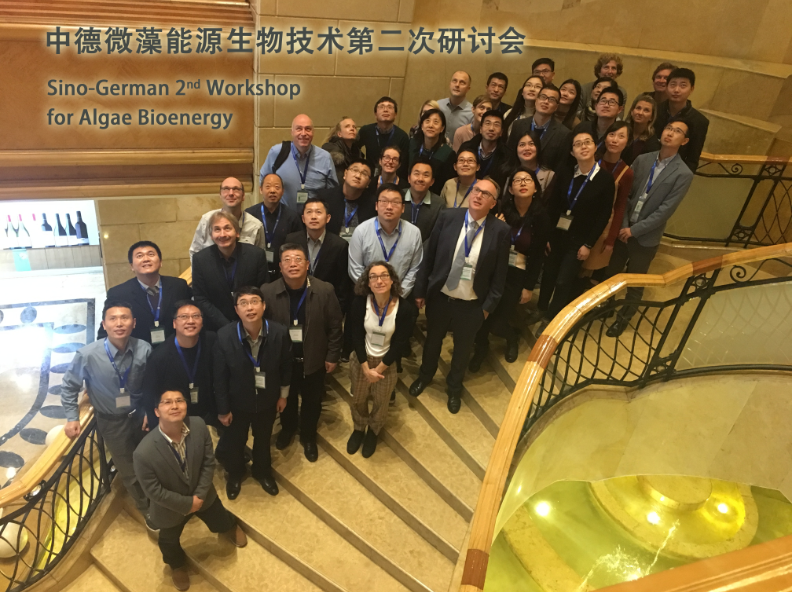Over 50 scientists from 17 institutions attended the Sino-German 2nd Workshop for Algae Bioenergy in Qingdao on November 26-28, 2018. They gathered to discuss collective efforts to move the frontier in algal bioenergy forward.

(Image by SUN Mingming)
These organizations included Ruhr-University Bochum (Germany), Michigan State University (USA), Korea Advanced Institute of Science and Technology (Korea), University of Edinburgh (Scotland), University of Liège (Belgium), Pilot National Laboratory for Marine Science and Technology (Qingdao, QNLM), Qingdao Institute of Bioenergy and Bioprocess Technology (QIBEBT) of Chinese Academy of Sciences (CAS), Institute of Microbiology of CAS, Dalian Institute of Chemical Physics of CAS, Institute of Hydrobiology of CAS, Peking University, Jinan University, Ocean University of China, Shenzhen University, Synthetic Genomics Inc. and TOTAL RC Biofuels Division.
This workshop was jointly organized by Ruhr-University Bochum and QIBEBT, and its theme is “Single Cells – Recent Trends in Microbial Biotechnology & Nannochloropsis Synthetic Biology”. Jens Hofmann, the counsellor of the German Embassy in China, attended the meeting. In his address, he extended warm congratulations to the conference and affirmed the support from German government for the long-term cooperation between China and Germany in microalgal biofuels and synthetic biology. Xuyong WU, deputy director of Qingdao Science and Technology Bureau, offered warm welcome and hearty congratulations. He briefly introduced the strategy of innovation-driven development in Qingdao and emphasized the impact of this seminar series for the research and industry of microalgae biotechnology in Qingdao.
During the three-day session, representatives visited QIBEBT, QNLM, Qingdao Bright Moon Seaweed Group Co., Ltd. and BGI Genomics (Qingdao). Experts and scholars gave 30 presentations, focusing on the functional genomics and metabolic engineering in cyanobacteria, Chlamydomonas reinhardtii, Pyropia yezoensis, Gracilariopsis lemaneiformis (Rhodophyta), and etc. The theme of the special session on November 28, organized by Profs. Jian XU and Qiang HU, was “Nannochloropsis Synthetic Biology”. For the industrial oleaginous microalgae of Nannochloropsis spp., participants presented the recent progress on photosynthesis, carbon fixation, oil production, signaling transduction, metabolic regulation and cell factory construction. Moreover, they reviewed the latest development on core platforms on protein design, genomic editing and metabolic engineering of these organisms. In the end, a consensus for starting an international collaboration project entitled “Nannochloropsis Design and Synthesis Initiative (NanDeSyn)” was reached.
The Sigal4NRG-Sino-German Lab for Algae Bioenergy has been established since April, 2018. It is sponsored by the federal government of Germany and the first phase lasts five years. Prof. Thomas Happe from Ruhr-University Bochum and Prof. Jian XU from QIBEBT are PIs of this collaboration from Germany and China respectively. The German team is specialized in photosynthesis, proteomics and cell image processing of Chlamydomonas reinhardtii, while the Chinese team’s expertise includes metabolic engineering and systematic biology of Nannochloropsis and the Raman-activated Cell Sorting platform. The joint lab takes full advantage of the complementarity of expertise at both sides and aims to together develop novel solutions for the nascent algal biofuel industry via the synthetic biology of industrial microalgae.